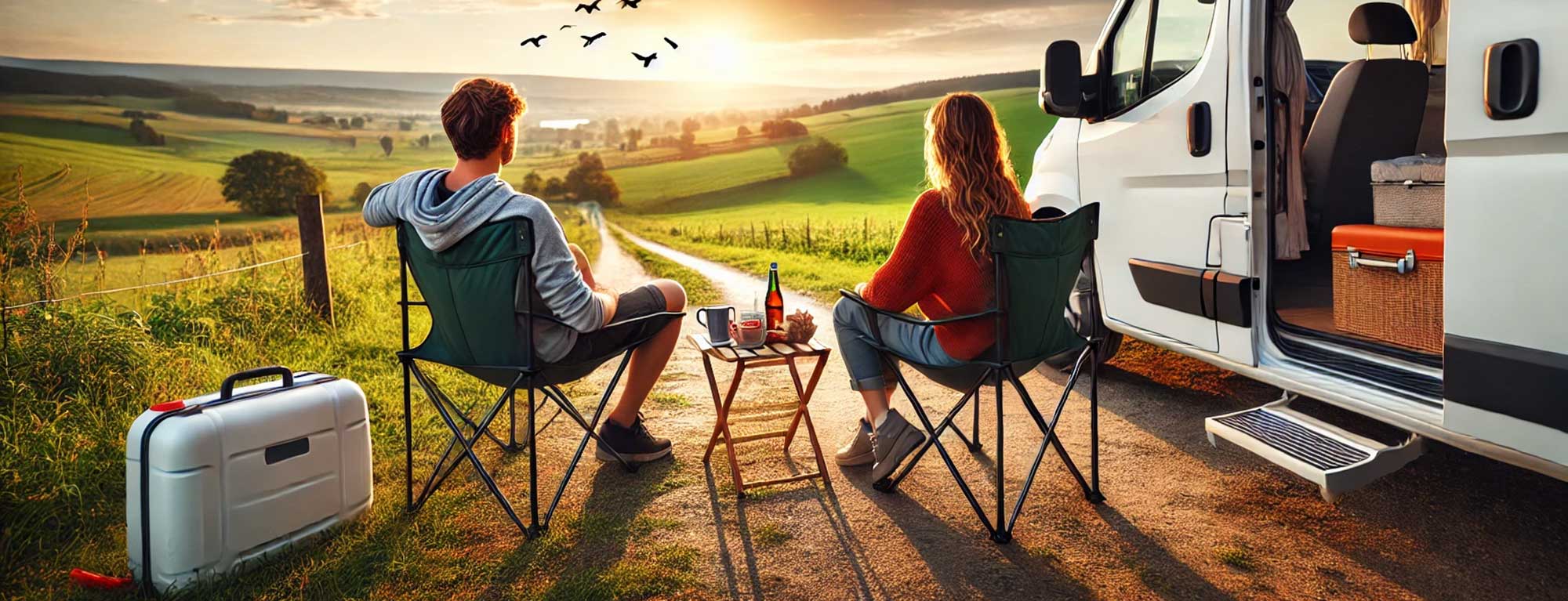That last trip might have been epic – coastal roads, stargazing nights, bacon sarnies with a sea view. But now it’s time to tuck the camper away until the next getaway. And whilst it might feel like a pause, this is where the real test of care begins.
Because how you store your campervan between trips matters more than most think. Get it right, and the next journey starts with the turn of a key. Get it wrong, and it’s all leaks, mildew, flat batteries and frustration.
Why Campervan Storage Is More Than Just Parking
Just imagine this: someone parked their camper in the driveway for winter, didn’t think twice, and come spring… mouldy upholstery, dead electrics, and tyres flatter than a campsite pancake. That could be avoided with just a bit of thought.
Secure the Van – Like You Mean It
- Lock Everything: Sounds obvious, but every door, window, and rooflight needs to be properly secured. Thieves know which ones are often left ajar.
- Use a Steering Wheel Lock: A visible deterrent. Old-school, but still effective.
- Install a Tracker: Especially useful if your van is stored away from home. It could also bring down your insurance premium.
- Think About Location: A secure storage site with cameras and access control is ideal. If storing at home, light the area well and consider motion-activated CCTV.
Batteries and Electrics – Don’t Let It Die
- Charge the Leisure Battery: Either disconnect it or top it up with a smart charger every few weeks.
- Start the Engine Now and Then: If safe to do so, run the engine for 15 minutes every few weeks to keep things ticking.
- Turn Off Isolators: Many vans have battery isolators – use them to avoid phantom drains from alarms or tracking devices.
 More relaxation, less stress – that’s the power of great insurance.
More relaxation, less stress – that’s the power of great insurance.Keep Damp and Mould at Bay
- Clean Thoroughly: Crumbs, wet towels or forgotten food will become a breeding ground for all things nasty.
- Leave Ventilation Slightly Open: If it's secure and dry, cracking open roof vents slightly can help air circulation.
- Use Dehumidifiers: Moisture-absorbing pots are cheap and cheerful – and work wonders over winter.
- Empty the Water System: Drain everything – pipes, tanks, boiler. Residual water can freeze and split things. Not fun to repair.
Tyres, Weight and Where You Park
- Move It Occasionally: Rolling it back and forth a few feet prevents flat spots on tyres.
- Inflate to Max PSI: Fully inflating tyres before storage helps preserve shape.
- Avoid Grass: Parking on grass can draw moisture and accelerate corrosion underneath. A paved or gravelled spot is far better.
Don’t Forget the Habitation Side
- Empty the Fridge: And leave the door ajar. Nobody wants to open it in spring and hunt for a science experiment.
- Remove Soft Furnishings: If damp is likely, take cushions and bedding indoors.
- Check Gas Bottles: Turn off at the bottle. Better yet, disconnect and store safely.
Insurance Considerations
Leaving your van unattended for weeks or months? It’s worth double-checking what the insurance covers during this period. Some policies require vans to be kept at a specific location or may not cover theft from the driveway. No one wants a claim refused because of a fine-print technicality.
Get Into the Habit
It’s easy to think you’ll just leave it for a week… which turns into two months. So get into a routine. A five-minute check every fortnight – tyres, leaks, battery, security – can save a world of pain later.
Looking to keep your camper protected during the off-season? A good insurance quote can make all the difference when unexpected trouble strikes. You’ve looked after your camper – now make sure the policy does too.


